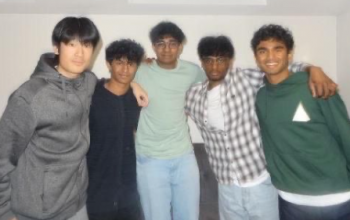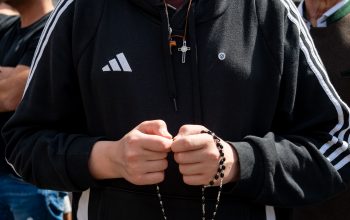Kingston is home to over 12,000 Tamils, who celebrated the New Year on 14 April.
Tamil is one of the world’s oldest languages, primarily spoken in southern India and Sri Lanka. It is also one of the most spoken languages in Kingston upon Thames.
Puthandu, or Tamil New Year is marked by reflection, hope, worship and traditional dishes, such as Sakkarai Pongal, which combines sweet, sour, bitter and spicy flavours to reflect different life experiences.
The borough has a close connection with the community, having been twinned with the Sri Lankan city of Jaffna since 2016.
Kingston Tamil School has provided cultural and language education to the Tamil diaspora in South West London for almost four decades, aiming to keep children from the community in touch with their heritage.

Ahead of its milestone 40th birthday in March next year, Chairman of the school, Dr Seevaratnam Jegandan, said: “We started off with only a handful of students and now here we are, with nearly 200 students. It’s phenomenal.”
He added: “We get a very positive response from parents. They are always looking for ways to get their kids to talk and engage with their mother language.
“It’s an opportunity for people in a multicultural society to see where they sit in terms of their identity and where they come from.”
Sir Ed Davey MP and members of Kingston Council marked this close connection with the community by attending Tamil History Month events, such as the Harvest Festival, in January.
Speaking on the personal impact of the School, Jegandan, who is Tamil, said: “When I moved from Woking to Kingston, I was looking for a place to take my kids to learn Tamil. Now, whenever they meet their grandparents back home in Sri Lanka or India, they can talk to them in their mother language and feel more like they are part of the community.
“Not being able to communicate was quite a barrier.”
He explained that while some events, like the language classes, are tailored to Tamil speaking people, others, like yoga, are open to all.
“This is a place where we bring people from different backgrounds together,” said Jegandan.
By fostering multilingualism in young Tamil’s, the school keeps one of the oldest languages and cultures in the world alive in Kingston.
It also helps stop the tide of falling foreign language skills amongst young people in England.
According to the Higher Education Language Institute, a UK charity and think tank, England falls far behind the rest of Europe in multilingualism for young people.
It suggested that scrapping a language as a compulsory GCSE choice in 2004 has caused young people to turn away from learning languages.
In 2001, 600,000 English pupils took a Modern Foreign Language (MFL) as a GCSE. However, by 2024, this had fallen by 62% to 370,000 pupils.
Similarly, Language A-Level uptake has decreased.
In 2001, 34,400 English pupils took an MFL A-Level, and in 2024, this figure had dropped by 39% to 24,642.
The shrinking appetite for language learning has led experts to call on the government for a national strategy to make learning a new language more exciting and accessible for young people.





